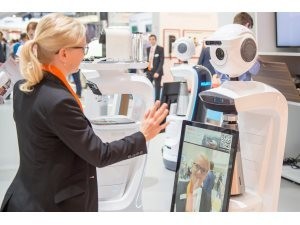Consumers’ thoughts on AI, robots, and digital security
Author: electronica

81 percent of consumers all around the world would like “electronic devices of the future” to make their lives easier. However, users have very different views on what artificial intelligence (AI), robotics, and digitalization should and shouldn’t be allowed to do. For example, 71 percent of global consumers think that, even in the future, electronic devices should only assist humans and that our own thought processes should not be replaced with AI. These are findings of the electronica trend index (2nd edition). In June 2018, a market research institute surveyed 7,000 consumers, representing cross-sections of their relevant populations in the USA, China, Japan, Germany, France, the UK, and Italy, for the world leading trade fair and conference, electronica.
Navigation systems and smartphones have popularized smart voice control in private households. Manufacturers are working at full speed with artificial intelligence and digital networking to build on the current success of smart electronics. The concept of voice control is clearly popular among consumers: Around 60 percent of consumers worldwide are in favor of electronic devices being able to engage in dialog with humans in the future—along the lines of familiar voice-activated assistants such as Siri, Alexa, and Cortana. Chinese (85 percent), US American (68 percent), and Italian (66 percent) consumers are particularly enthusiastic about being able to converse with electronic devices in the future. However, 17 percent of consumers all around the world strongly object to the concept of talking electronics.
What robots should and shouldn’t be able to do
There is a consensus amongst consumers that digital assistants shouldn’t be too “human-like”: In response to the question regarding how future service robots should behave, 72 percent are in favor of robots with artificial intelligence remaining clearly recognizable as machines. The strongest advocates for this are Italians (78 percent) and US Americans (77 percent). However, even in Japan, which comparably has the lowest level of support, there is still a clear majority of 69 percent in favor.
Robots should learn autonomously
By contrast, a global average of 72 percent of respondents are in favor of robots using artificial intelligence to learn autonomously and respond to new situations. The same percentage would like robots to provide decision-making support, although control should never be relinquished by humans.
This basic view generally applies to the use of artificial intelligence in electronic devices: The large majority of consumers would like AI to only provide assistance and not replace human thought processes—according to the latest survey, 71 percent of the world share this opinion. That being said, the number of people adhering to this view is declining in some countries. According to the 2016 electronica Trend Index, 82 percent of Germany's respondents shared this view, compared to the current figure of just 67 percent.
On the other hand, opinions as to whether a machine should be able to recognize human feelings and react to them are divided. In Japan and European countries, only around half of respondents are in favor; in the USA this figure is just under 60 percent, but China has the most positive response at 85 percent.
electronica 2018
“As the electronica Trend Index shows, consumers all around the world are thinking long and hard about the electronics of the future”, says Falk Senger, Managing Director of Messe München and responsible for the world-leading trade fair electronica. “At electronica 2018, from November 13–16 in Munich, over 3,000 exhibitors from 50 countries will be demonstrating just how rapidly the world of smart electronics is developing.”




